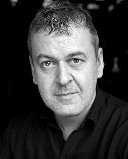 Alan Stocks is one of Liverpool’s most easily recognised actors. His time in plays as diverse as Dead Heavy Fantastic, The Flint Street Nativity, Tartuffe and Scouse Pacific has made him a firm favourite with theatre audiences.
Alan Stocks is one of Liverpool’s most easily recognised actors. His time in plays as diverse as Dead Heavy Fantastic, The Flint Street Nativity, Tartuffe and Scouse Pacific has made him a firm favourite with theatre audiences.
For the last few weeks he has been in the outstanding play by Joe Ward Munrow, Held, at The Liverpool Playhouse Studio Theatre with the superb Pauline Daniels and the inspiring Ged McKenna. Alan’s performance in the production is arguably the finest of his career to date. Alan will soon be seen in the musical Mam! I’m ‘Ere! at The Dome alongside Stephen Fletcher, Eithne Browne, Drew Schofield, Helen Carter, Rachel Rae, Paul Duckworth and Keddy Sutton.
An actor of incredible repute, Alan talks to Liverpool Sound and Vision in the first of a two part interview about his time in Held and the intensity of working in such a powerful drama
How are you on this fine and rainy evening?
“I’m not too bad actually. I have had a hell of a week doing the Christmas show in the day time and trying to contribute to that, even though obviously it is Stephen Fletcher’s baby, it is very much a work in progress and its very, very technical as far as dance goes. Normally in some shows, the dancing tends to be quite rudimentary in a way. In this though we have a wonderful woman who is really out to make a mark and is really passionate about the movement and she will have a look and a statement and she has been very powerful and that’s great but when you have people of a certain age you start to sweat after a few minutes and she says well show me then and you think, what do you mean show you and we had to do it again (laughs), so that’s been a bit weird and then after a full day I have been running down the hill to perform at the Playhouse in Held. I packed in smoking seven months ago, best thing I ever did. I was killing myself so I stopped overnight, I have put a bit of weight on and I can handle that as I am a big lad but it means I have to get rid of it. So going up and down the hill on my bike plus the six or seven miles into work in the morning…in the rain and I am really proud of myself for that.
Having said that, by the time I get through the day job as I call it and by the time I get down the Playhouse for what is a very sensitive piece about dementia and a loss of loved ones and how to deal with it then I start… I need to stop for a bit. You just can’t join straight in, it becomes too twilight zone. So I try to find a moment or two, half an hour or an hour if I can just to let that go and tune back into the play. Of course everyone else is going home and reading scripts or working on the songs and I am not doing that. (laughs) I can hold a tune but I am the guy that needs to do that extra little bit and then that makes me feel a little bit guilty. Yes I have had a bit of a mad week. We did five shows of Held in three days and that was always going to be the tipping point of the whole run and we made it and we did it, every show has been really good.”
Forgive me for saying this, I said at the time it was the best performance I had ever seen you give in such an amazing play.
“Yes, you did and it was an amazing play. I agree with you, I don’t think I’ve ever felt as rooted, in the moment. For instance at drama school, the exercises you do that are supposed to find the private world of this or that character and you hardly ever do really. The director of Held, Lorne, has worked in a way I have never worked before and he is younger than me and that is always quite…it’s like looking at a policeman and thinking how old are you but it’s great to be able to say that it is your idea and I am with you one hundred per cent, I will step off the ledge for you and to be able to do that after you have been in the profession for a while actually makes you think.”
It is an astonishing piece of work! The dynamic between the three of you on stage, especially when you were moving chairs was almost like a ballet routine.
“That’s interesting yes. That was one of the ideas that I think the cast had to think about quite a lot and it’s slightly surreal, the whole world. Again you have this young director who is renowned for doing quite spectacular pieces in very small spaces. He has got his own company that does that and everyone really respects him for what he does but at the same time it’s not always comfortable theatre and its’ not always perfect theatre and that was one of those ideas where the cast went o.k., yep, don’t quite understand why, I understand your explanation of why, it’s an image we are trying to explain. The mum’s world has been displaced and we are trying to protect her by putting things back in order using the chairs. Using that as an actual image though is a bit in your face but that was because we hadn’t seen the overall view of the production, you know with the lighting and everything else.
It is quite a nice thing to do now, it wasn’t at first. There is no set piece at all, Pauline moves the chairs where she wants and moves anything she wants and it is up to us to not be in her way and then make it better.”
It’s almost like playing chess with somebody who has no idea of the rules?
“You know what, that’s probably a really good analogy of it, that’s exactly what it is. We have never really gone wrong. We sometimes get to a point, there have been moments where we have gone for a chair which Ged has been holding and then there is this stand-off. At the same time as Pauline is talking about the kids in the bath, Ged gives way but then you think was that supposed to happen, I don’t know. There is no correct way of doing it, it’s one of those moments within the piece. I think I am allowed to say we have never had a bad show and it is a very weird thing to say. I think the reason for that, there are several reasons but I think one of them is the quality of the work is very good.
The directing was also very sensitive to the writer, they worked together really closely and Joe is very sensitive to what he was told by Lorne to look at, or maybe discard. We spent a week saying our words. The director would stand behind you and say your line and you then say what you had said and that sounds really odd I know it does but when it’s happening…by the time you have got through the play it’s taken about four days. You almost know the lines as you have not just heard them but you have had to explain them so by the time you go back to the beginning of the play you find you kind of know the lines and you certainly know what every scene is about. The rest of it becomes all about the effort, the effort to be in the play situation in what you don’t want to be in with people you would choose not to be with but have to get a result from which involves making somebody do something but in a way that’s all acting is.
For half the play, my character wants his brother to understand why we need to do this and he wants me to understand why we can’t just do this and there comes a crux in the story where my character becomes scared and realises this can’t go on forever and kind of wants his brother to make it o.k. and take control. This becomes quite aggressive, it’s not one of these please help me moments, in today’s world if you want help of someone you can be quite nasty about it, you find a way of getting there that isn’t quite saying please help me so there is a lot of that going on. So in the end my brother does take control, that actual control so I have to deal with then. Not only that but he brings her back which is what I wanted but he brings her back to the horrible place she had been living in. It is a simple thing to engage in but I have never known a piece before that has been that sort of up and down, fluid, but always really wanting something. I think that is what makes it interesting to watch and interesting to be in. People always want someone to do something, just to do something to not let them be in that situation. I am very, very proud to have been in it. Possibly prouder than anything else I have done.”
That’s why I said at the time, I felt honoured to have seen you in this as it is the best work you had ever done.
“It was a great cast. I have known Pauline for a while, she is a lovely woman and it’s great to see her playing to her strengths. Ged and I had never met before and he was a joy to work with. The casting was brilliant, quite sublime which was done by Lorne and he sat with us, really close up and he looked into my eyes all the way through it and we read this one scene and I thought…I read this scene at home and to be honest I didn’t see an awful lot in it but reading with him it seemed to be really interesting. Of course he has been an actor himself.
There was a honesty between me and Ged on the stage where whatever happens, whether we cut into each other or forget something it really didn’t matter because we knew each other well enough by this stage to know we would get through it and we knew whatever happens is done with honesty and with love. Considering the subject matter, you wouldn’t believe the walk upstairs from the dressing rooms is bizarre. We all walk upstairs and of course Pauline’s always got an anecdote or two and we are all laughing away and it’s not until we are in the back room and that first light comes on that we all settle. Even afterwards…my point is it is such a happy bond between the three actors. For the subject matter you would think we all go away and throwing ourselves on to rocks. It’s so not that.”
Part Two of this interview will be in Liverpool Sound and Vision’s Sunday Post Script.
Ian D. Hall.
